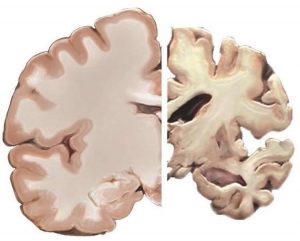Uncategorized Monday, 2018/11/19
Alzheimer's disease is one of the most common forms of dementia. More than 30 million people worldwide suffer from Alzheimer's disease. Unfortunately, there is currently no cure for the disease, only drugs that relieve the symptoms of the patient; in a recently published dissertation, the author (Professor Ruth Itzhaki of the University of Manchester) proposed a new method for the treatment of Alzheimer's disease. The researchers pointed out that some studies have shown that herpes virus may be one of the reasons inducing Alzheimer's disease. Therefore, effective and safe antiviral drugs may be expected to treat Alzheimer's disease, and even prevent the occurrence of Alzheimer's disease by giving children a herpes virus vaccine.
Herpesvirus is involved in the development of Alzheimer's disease. It is well known that herpes simplex virus type 1 (HSV1) causes herpes. In infancy, the virus infects most people and remains dormant in the peripheral nervous system. When under stress or low immunity, the herpes virus is activated and causes herpes in certain people's bodies. In 1991, researchers discovered the presence of HSV1 in the brains of many older people. Later, in 1997, they found that when the herpes virus was present in the brain of patients carrying the APOE4 gene, the virus would mediate high-risk Alzheimer's disease occurs.

The herpes virus is repeatedly activated in the body's brain and induces some cumulative damage. Compared to individuals who only carry one of the APOE4 gene or HSV1, the risk is increased by 12 times when the individual carrying both of these causes to develop Alzheimer's disease. The researchers then found that HSV1 infection in cultured cells induced the accumulation of β-amyloid and abnormal tau, and the accumulation of these proteins in the brain is the main feature of Alzheimer's disease.
Researchers believe that HSV1 is the main cause of Alzheimer's disease. As individuals grow older, HSV1 enters the brain when the immunity is underground, and then it establishes a long-lasting dormant infection pattern. Once an individual experiences stress, underground immunity, brain inflammation, etc., HSV1 is activated in the patient's body. Reactivation of HSV1 results in direct viral damage and viral-induced inflammation in infected cells. The investigators noted that repetitive activation can induce cumulative damage, which in turn causes individuals with the APOE4 gene to develop Alzheimer's disease.
It is speculated that in individuals carrying APOE4, Alzheimer's disease begins in the brain because HSV1 induces a large number of toxic products in the brain and reduces the function of brain repair.
New therapy
There is research evidence that antiviral agents can be used to treat Alzheimer's disease, and some safe antiviral drugs can effectively inhibit the function of herpes virus, thus limiting the damaging effect of the virus on the body. In an early study, the researchers found that the anti-herpes virus drug acyclovir was able to effectively block HSV1 DNA replication and reduce the levels of beta-amyloid and tau in HSV1-infected cells.
It is worth noting that all studies, including the author's research, only clarified the relationship between herpes virus and Alzheimer's disease, and did not prove that herpes virus is the cause of Alzheimer's disease in individuals; perhaps the only way to proof herpes virus is the cause to induce Alzheimer's disease is to target it through a specific antiviral agent, or to vaccinate the individual with herpes virus to effectively reduce the incidence of disease in the population.
To the researchers' excitement, scientists have conducted a large-scale study in Taiwan, China, confirming that the use of special anti-herpes virus preparations can successfully prevent Alzheimer's disease. The researchers hope to come from other countries in the later period. Research can also get similar research results.
Reference: Ruth F. Itzhaki. Corroboration of a Major Role for Herpes Simplex Virus Type 1 in Alzheimer’s Disease. Front. Aging Neurosci., 19 October 2018, doi:10.3389/fnagi.2018.00324 Jamieson GA, Maitland NJ, Wilcock GK, et al. Latent herpes simplex virus type 1 in normal and Alzheimer's disease brains. J Med Virol. 1991 Apr;33(4):224-7. Itzhaki RF, Lin WR, Shang D, et al. Herpes simplex virus type 1 in brain and risk of Alzheimer's disease. Lancet. 1997 Jan 25;349(9047):241-4. Wozniak MA, Itzhaki RF, Shipley SJ, et al. Herpes simplex virus infection causes cellular beta-amyloid accumulation and secretase upregulation. Neurosci Lett. 2007 Dec 18;429(2-3):95-100. Epub 2007 Oct 13. Zambrano A, Solis L, Salvadores N, et al. Neuronal cytoskeletal dynamic modification and neurodegeneration induced by infection with herpes simplex virus type 1. J Alzheimers Dis. 2008 Jul;14(3):259-69. Wozniak MA, Frost AL, Preston CM, et al. Antivirals reduce the formation of key Alzheimer's disease molecules in cell cultures acutely infected with herpes simplex virus type 1. PLoS One. 2011;6(10):e25152. doi: 10.1371/journal.pone.0025152 Tzeng NS, Chung CH, Lin FH, et al. Anti-herpetic Medications and Reduced Risk of Dementia in Patients with Herpes Simplex Virus Infections-a Nationwide, Population-Based Cohort Study in Taiwan. Neurotherapeutics. 2018 Apr;15(2):417-429. doi: 10.1007/s13311-018-0611-x Itzhaki, Ruth F,Lathe, Richardc. Herpes Viruses and Senile Dementia: First Population Evidence for a Causal Link, Journal of Alzheimer's Disease, vol. 64, no. 2, pp. 363-366, 2018, doi:10.3233/JAD-180266 Alzheimer’s disease: mounting evidence that herpes virus is a cause. Ruth Itzhaki, October 19, 2018 10.32pm AEDT
